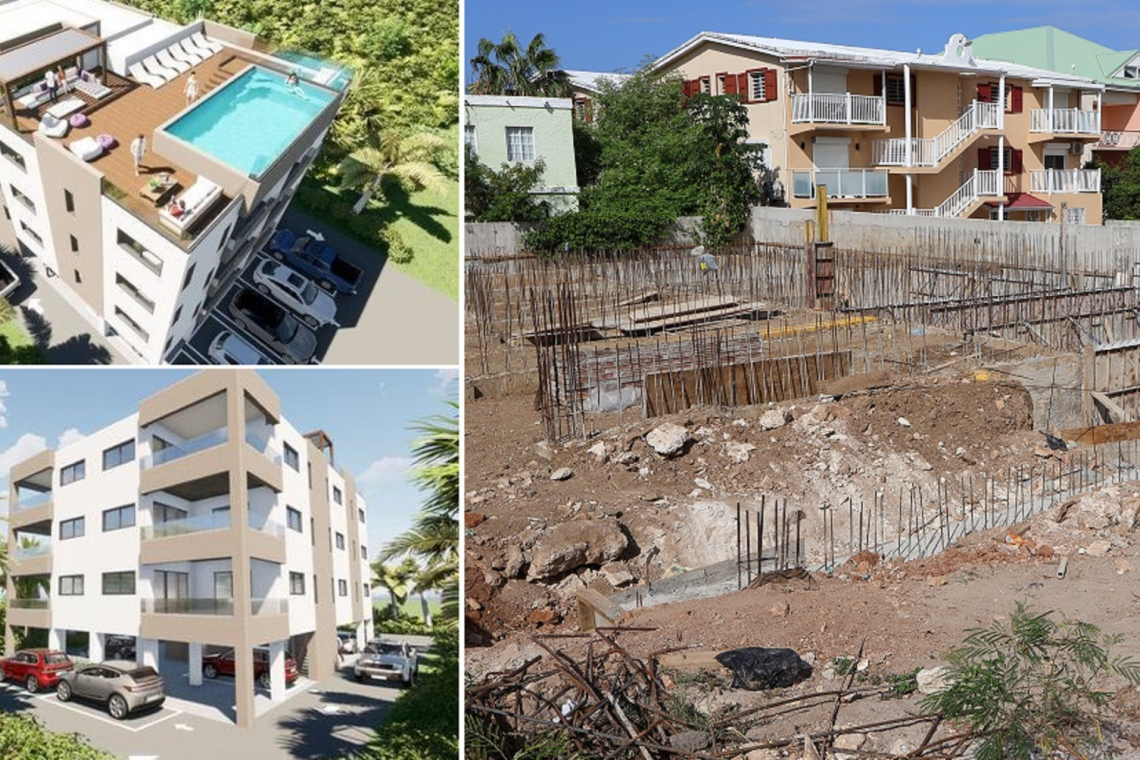Architectural renderings of 'Villa Sasha” on the left, and the construction site on the right.
PHILIPSBURG--The Court of First Instance has ruled in favour of the Pride of Beacon Hill homeowners Association (PBHA) in its challenge against the Ministry of Public Housing, Spatial Planning, Environment, and Infrastructure VROMI. The case centred on the controversial reissuance of a building permit for a high-density apartment complex in a quiet residential cul-de-sac, despite an earlier revocation and critical advisory opinions.
The dispute revolves around the construction permit granted on September 8, 2022, to Sasha Management N.V. for a five-storey apartment complex known as “Villa Sasha”, complete with a rooftop swimming pool. The development, located in an already densely built and narrow cul-de-sac in Beacon Hill, was granted a residential permit with several exemptions hidden in the fine print, effectively enabling a commercial development in a residential-only zone.
PBHA, represented by attorney Femi Kutluer, argued that the permit had been reissued without proper legal justification or due process, and that their objections – as well as an earlier advisory opinion recommending denial – had been disregarded. Despite the legal deadline for appeal having passed, the Court accepted the Association’s case on the grounds that the residents only became aware of the reissued permit in March 2024, due to the government’s failure to publish the decision. The appeal was filed within six weeks of that discovery, which the Court found to be within reasonable time.
Government attorney Richard Gibson Jr. was unable to provide a convincing defence of former VROMI Minister Egbert Doran’s decision to reissue the permit. The Court emphasised that Doran's failure to explain his deviation from the objections and advisory recommendations constituted a violation of principles of due care and proper reasoning, as stipulated under the National Administrative Justice Ordinance LAR.
As a result, the Court annulled the 2022 building permit and declared the Association’s appeal well-founded. A new decision on the development must now be made, with proper consideration of earlier objections, neighbourhood impact, and applicable planning standards.
Parking and building density
A key issue raised by PBHA concerned the sufficiency of parking spaces. The developer claimed compliance by providing 13 spaces for 12 one-bedroom units. However, the Association argued that several of the apartments were marketed as two-bedroom units and could easily be converted, potentially requiring at least 18 parking spaces under current policy. They also questioned the size and accessibility of the designated parking spots.
The Court acknowledged the conflicting interpretations but ultimately sided with the government on this point. It concluded that, based on the submitted building plan, 13 spaces met the official parking policy. Speculations about future conversions or marketing strategies were deemed irrelevant unless enforced through separate legal proceedings. The Court also found the objections regarding parking space dimensions and access insufficiently substantiated.
Policy violations
More significantly, the Court took issue with the government’s failure to apply its own policy framework, particularly the Simpson Bay Development Plan (SBDP), which covers the Beacon Hill
area. Though not formally adopted into law, the SBDP has been publicly available since 2014 and is consistently used as a planning tool to evaluate developments in the Simpson Bay area. The plan sets out height and density limits which the Villa Sasha project clearly exceeded.
PBHA argued that the government should have evaluated the permit request against the SBDP when determining whether the proposed construction would cause nuisance or disfigurement to the neighbourhood. Government attorney Gibson Jr. initially claimed the SBDP held no legal weight but later admitted that the Ministry of VROMI’s own planning department continues to use the SBDP as policy guidance.
The Court agreed with PBHA, stating that deviation from a publicly recognised and consistently applied policy requires proper justification, which was lacking. The Court emphasised that such disregard undermines legal certainty and the rights of residents to transparent governance.
Nuisance and visual impact
The Court also gave weight to the potential for (noise) nuisance and obstruction of views caused by the project, especially given the inclusion of a rooftop swimming pool and the intention to market the units for short-term rentals, such as Airbnb. These features further deviated from the residential character of the neighbourhood and exacerbated concerns over tranquillity and safety.
Although the permit holder claimed that surrounding buildings already exceeded the SBDP height limits, the Court instructed the government to carefully consider the specific site conditions, including height and density comparisons, as well as the findings and 3D models submitted in the objection phase.
Annulment of permits
In its conclusion, the Court annulled both the September 8, 2022 permit and the original permit from July 2022, linking them as part of a flawed decision-making chain. Minister of VROMI Patrice Gumbs has been ordered to issue a new decision on the building application dated February 23, 2021, within three months, taking into account the advisory committee’s opinion, neighbourhood characteristics, and the site-specific impacts raised by both objectors and the developer.
Additionally, the Court directed the Minister of VROMI to formally communicate the new decision to all interested parties and to base its reasoning on consistent policy application and factual evidence.
As the appeal was upheld, the Court ordered the government to reimburse PBHA’s legal costs, amounting to Cg. 1,400 for legal services and Cg. 150 in court fees.







